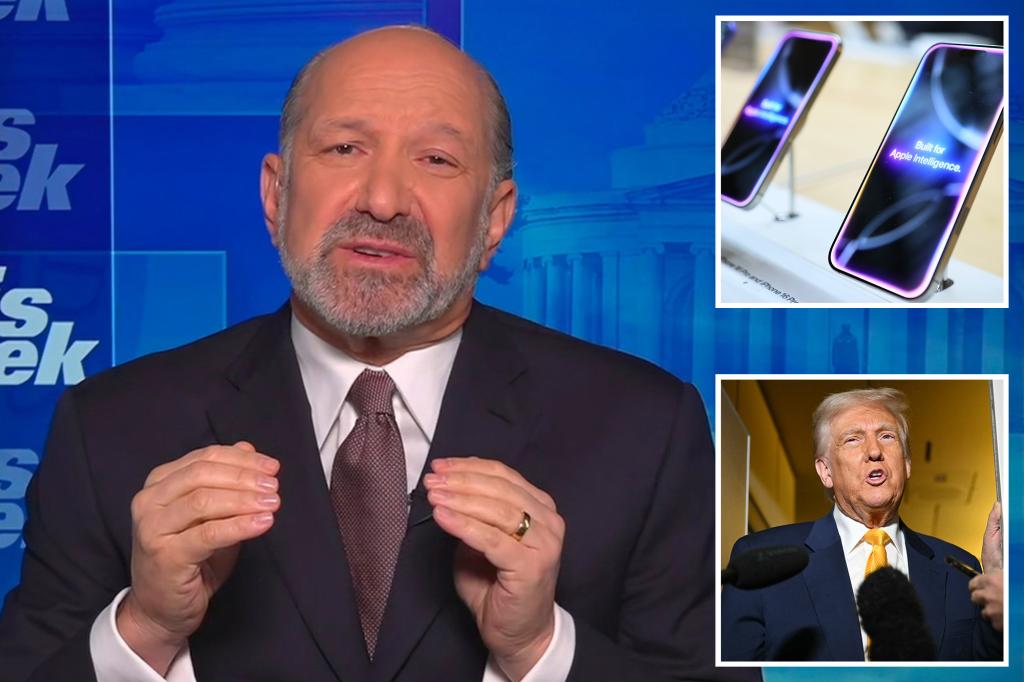President Trump’s tariff exemption for iPhones and other Chinese-made electronics may only be temporary, Commerce Secretary Howard Lutnick said Sunday — just two days after the White House announced the change.
“So what he’s doing is he’s saying they’re exempt from the reciprocal tariffs, but they’re included in the semiconductor tariffs, which are coming in probably a month or two. So these are coming soon,” Lutnick told ABC News’ “This Week” on Sunday.
“All those products are going to come under semiconductors, and they’re going to have a special focus type of tariff to make sure that those products get restored.”
Late in the day on Friday, Trump’s team filed a rule that exempted a myriad of electronic devices from the president’s “reciprocal” steep tariff on Chinese imports to the US.
The ruling granted a reprieve for Apple and other consumer elecontrics makers, who were facing tariffs of up to 145% under Trump’s sweeping new rules.
More than 80% of Apple products are assembled in China, according to data from Evercore ISI. Apple CEO Tim Cook has courted close relations with Trump amid the tariff push.
Even before Trump upped the ante on China, experts were suggesting that top iPhone models could increase in price to $2,300 under the tariff regime.
Last Wednesday, as Trump’s suite of customized “reciprocal” tariff rates were set to go into effect, the president abruptly reversed course and announced a 90-day pause while his team negotiates new deals with various countries. Trump remarked that people were “getting a little bit yippy, a little bit afraid” as markets cratered amid tariff fears.
Trump kept the 10% baseline tariff on virtually all imports in effect and announced a 125% tariff against goods and services coming in from China. White House officials clarified that China will still face a 20% tariff announced earlier this year due to fentanyl concerns, which brings the total rate on most Chinese imports to 145%.
China is America’s third-largest trading partner
Electronics products from China would still face other tariffs, such as the 20% rate Trump imposed earlier this year amid his complaints against China’s role in the fentanyl crisis.
“We need to have semiconductors, we need to have chips, and we need to have flat panels — we need to have these things made in America. We can’t be reliant on Southeast Asia for all of the things that operate for us,” Lutnick added.
Lutnick explained that the Trump administration is looking to add tariff incentives to “encourage” the pharmaceutical industry to restore its manufacturing in the US as well.
“We can’t be beholden and rely upon foreign countries for fundamental things that we need,” Lutnick argued. “So this is not like a permanent sort of exemption. He’s just clarifying that these are not available to be negotiated away by countries. These are things that are national security that we need to be made in America.”
Before Trump paused the customized tariff rates last Wednesday, his top lieutenants had been publicly adamant that the president did not intend to include any exemptions and that his protectionist shift was not a negotiating ploy.
Senior counselor for trade and manufacturing Peter Navarro again on Sunday insisted that Trump’s “policy is no exemptions, no exclusions,” despite the reprieve for electronics.
“The problem, interestingly for chips, because this is very complex stuff, is that we don’t buy a lot of chips, like in bags. We buy them in products. So what Secretary of Commerce Howard Lutnick is doing as we speak is an investigation of the chip supply chain,” Navarro told NBC’s “Meet the Press” on Sunday.
It is not clear what rate the Trump administration is eyeing for its planned semiconductor tariff.
Former President Joe Biden attempted to re-shore semiconductor manufacturing through the 2022 bipartisan CHIPS and Science Act, which featured subsidies to chip companies. Trump has been critical of the CHIPS Act and argued that tariffs are a more effective means of bringing back semiconductor production to the US.


